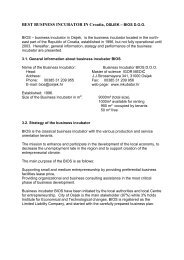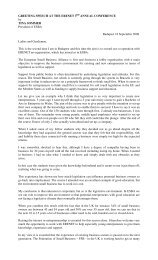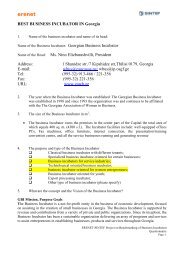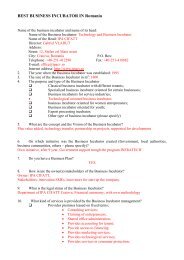European Charter for Small Enterprises - European Commission
European Charter for Small Enterprises - European Commission
European Charter for Small Enterprises - European Commission
Create successful ePaper yourself
Turn your PDF publications into a flip-book with our unique Google optimized e-Paper software.
EUROPEAN CHARTER FOR SMALL ENTERPRISES<strong>Small</strong> enterprises are the backbone of the <strong>European</strong> economy. They are a key source ofjobs and a breeding ground <strong>for</strong> business ideas. Europe’s ef<strong>for</strong>ts to usher in the neweconomy will succeed only if small business is brought to the top of the agenda.<strong>Small</strong> enterprises are the most sensitive of all to changes in the business environment.They are the first to suffer if weighed down with excessive bureaucracy. And they are thefirst to flourish from initiatives to cut red tape and reward success.At Lisbon we set the goal <strong>for</strong> the <strong>European</strong> Union to become the most competitive anddynamic knowledge-based economy in the world, capable of sustainable economicgrowth, more and better jobs and greater social cohesion.<strong>Small</strong> enterprises must be considered as a main driver <strong>for</strong> innovation, employment as wellas social and local integration in Europe.The best possible environment <strong>for</strong> small business and entrepreneurship needs there<strong>for</strong>e tobe created.PrinciplesIn urging <strong>for</strong> this, we:• Acknowledge the dynamic capacities of small enterprises in answering to new marketneeds and in providing jobs;• Stress the importance of small enterprises in fostering social and regionaldevelopment, while behaving as examples of initiative and commitment;• Recognise entrepreneurship as a valuable and productive life skill, at all levels ofresponsibility;• Applaud successful enterprise, which deserves to be fairly rewarded;• Consider that some failure is concomitant with responsible initiative and risk-takingand must be mainly envisaged as a learning opportunity;• Recognise the values of knowledge, commitment and flexibility in the new economy.The situation of small business in the <strong>European</strong> Union can be improved by action tostimulate entrepreneurship, to evaluate existing measures, and when necessary, to makethem small-business-friendly, and to ensure that policy-makers take due consideration ofsmall business needs. To this end, we pledge ourselves to:• Strengthen the spirit of innovation and entrepreneurship which enables <strong>European</strong>business to face the challenges ahead;• Achieve a regulatory, fiscal and administrative framework conducive toentrepreneurial activity and improve the status of entrepreneurs;• Ensure access to markets on the basis of the least burdensome requirements that areconsistent with overriding public policy objectives;• Facilitate access to the best research and technology;• Improve access to finance throughout the entire life-cycle of an enterprise;
• Improve our per<strong>for</strong>mance continuously, so that the EU will offer the bestenvironment <strong>for</strong> small business in the world;• Listen to the voice of small business;• Promote top-class small business support.Lines <strong>for</strong> actionBy endorsing this <strong>Charter</strong>, we commit ourselves to work along the following lines <strong>for</strong>action, taking due consideration of small business needs.1. Education and training <strong>for</strong> entrepreneurshipEurope will nurture entrepreneurial spirit and new skills from an earlier age. Generalknowledge about business and entrepreneurship needs to be taught at all school levels.Specific business-related modules should be made an essential ingredient of educationschemes at secondary level and at colleges and universities.We will encourage and promote youngsters’ entrepreneurial endeavours, and developappropriate training schemes <strong>for</strong> managers in small enterprises.2. Cheaper and faster start-upThe costs of companies' start-up should evolve towards the most competitive in theworld. Countries with the longest delays and most burdensome procedures <strong>for</strong> approvingnew companies should be encouraged to catch up with the fastest. Online access <strong>for</strong>registration should be increased.3. Better legislation and regulationNational bankruptcy laws should be assessed in the light of good practice. The learningfrom benchmarking exercises should lead us to the improvement of current practices inthe EU.New regulations at national and Community level should be screened to assess theirimpact on small enterprises and entrepreneurs. Wherever possible, national and EC rulesshould be simplified. Governments should adopt user-friendly administrative documents.<strong>Small</strong> enterprises could be exempted from certain regulatory obligations. In this context,the <strong>Commission</strong> could simplify competition legislation to reduce the burden ofcompliance <strong>for</strong> small business.
4. Availability of skillsWe shall endeavour to ensure that training institutions, complemented by in-housetraining schemes, deliver an adequate supply of skills adapted to the needs of smallbusiness, and provide lifetime training and consultancy.5. Improving online accessPublic authorities should be urged to increase their electronic communication with thesmall business sector. Thus, companies will be able to receive advice, make applications,file tax returns or obtain simple in<strong>for</strong>mation online, there<strong>for</strong>e faster and more cheaply.The <strong>Commission</strong> must lead by example in this area.6. More out of the Single Market<strong>Small</strong> businesses are feeling the benefits from the re<strong>for</strong>ms underway of Europe’seconomy. The <strong>Commission</strong> and Member States must there<strong>for</strong>e pursue the re<strong>for</strong>msunderway aiming at the completion in the Union of a true internal market, user-friendly<strong>for</strong> small business, in critical areas <strong>for</strong> development of small businesses includingelectronic commerce, telecommunications, utilities, public procurement and cross-borderpayment systems.At the same time, <strong>European</strong> and national competition rules should be vigorously appliedto make sure that small businesses have every chance to enter new markets and competeon fair terms.7. Taxation and financial mattersTax systems should be adapted to reward success, encourage start-ups, favour smallbusiness expansion and job creation, and facilitate the creation and the succession insmall enterprises. Member States should apply best practice to taxation and to personalper<strong>for</strong>mance incentives.Entrepreneurs need finance to translate ambitions into reality. In order to improve theaccess of small enterprises to financial services, we will:• Identify and remove barriers to the creation of a pan-<strong>European</strong> capital market and tothe implementation of the Financial Services Action Plan and the Risk Capital ActionPlan;• Improve the relationship between the banking system and small enterprises bycreating appropriate access conditions to credit and to venture capital;• Improve the access to the structural funds and welcome initiatives by the <strong>European</strong>Investment Bank to increase funding available to start-ups and high-technologyenterprises, including equity instruments.
We will use effective indicators to assess progress over time and in relation to the bestin the world to rein<strong>for</strong>ce our learning, searching <strong>for</strong> better practice in all fields thataffect small business to continuously improve our per<strong>for</strong>mance.
















